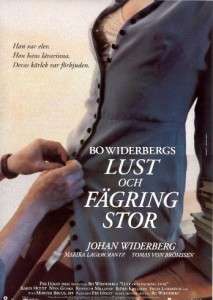All Things Fair
All Things Fair (Swedish: Lust och fägring stor, literally "Great Lust and Beauty") is a Swedish erotic drama film which was released to cinemas in Sweden on 3 November 1995,[1] directed by Bo Widerberg, about a sexual relationship between a teacher and her 15-year-old student in southern Sweden during World War II. Bo Widerberg's son Johan Widerberg stars as the boy and Marika Lagercrantz plays the teacher. The original title is taken from the Swedish hymn "Den blomstertid nu kommer", which is traditionally sung in schools before closing for the summer holiday.
| All Things Fair | |
|---|---|
 Theatrical release poster | |
| Directed by | Bo Widerberg |
| Produced by | Per Holst |
| Written by | Bo Widerberg |
| Starring |
|
| Cinematography | Morten Bruus |
Release date |
|
Running time | 130 minutes |
| Country | Sweden |
| Language | Swedish |
| Budget | 25 million DKK |
It was the last film to be made by Widerberg. It won several domestic and international awards and was nominated for the Academy Award for Best Foreign Language Film.[2]
Plot
This film is set in 1943 Malmö, when the rest of Europe was embroiled in World War II. It deals with the attraction of a 15-year-old boy Stig to his 37-year old teacher Viola. The film revolves at first around the sexual encounters between Stig and Viola; then, as the plot develops, Stig forms a close friendship with Viola's husband Frank, a hard-drinking salesman who is quite aware of what is going on with his wife but does nothing to prevent it.
Meanwhile, Stig's virgin neighbor and schoolmate Lisbet is secretly in love with him. During an outdoor party held outside his house, she says she wants to show something and directs him to his room. As they enter, she locks the room and asks him to close his eyes. She then strips down before him to seduce him into having sex with her. She shows him a hidden condom under the pillow and rag under the bed to soak up any blood since it would be he first time having sex. He doesn't reciprocate her advances and humiliated, she quickly dresses and leaves the room before Stig can explain.
The next day at school, Stig hides in a vault box for sports equipment after Lisbet's gymnastics class. He catapults a note towards her with a message for her to approach the box. After reading the note Lisbet encourages her friend to go to the restroom and while she is away, Lisbet joins Stig in the vault. Her friend later leaves the room alone, while Stig and Lisbet get laid inside the vault. Suddenly, the next class uses the vault, entrapping them until the end of that class. As they get out from the vault after that class, it is revealed that they are dating. Stig breaks Viola up, igniting her rage before the class.
During a movie class event, Lisbet finds Stig in the janitor room having sex with Viola. Stig tries to explain but Lisbet is really mad at him that she breaks up the relationship and tells him that she does not want to see him again.
Eventually, Viola descends into drink, like her husband. After threatening Stig with a broken bottle, their relationship ends. Stig is broken that he loses both his sexual relationship, and his brother, who dies while in military service. Viola decides to fail Stig by making him repeat his third year. On rapport day, Stig denounces Viola by showing his genitals and not taking his rapport. Moreover, he manages to steal Viola's set of dictionaries.
Cast
- Johan Widerberg as Stig Santesson
- Marika Lagercrantz as Viola
- Tomas von Brömssen as Kjell, "Frank"
- Karin Huldt as Lisbet
- Björn Kjellman as "Sigge" Santesson
- Kenneth Milldoff as Stig's father
- Nina Gunke as Stig's mother
- Peter Nilsson as Class prefect
- Jossi Sabbah as Isidor "Isse" Blecher
- Linus Ericsson as Peter
- Magnus Andersson as "Trötter"
- Frida Lindholm as Olga
- Monica Stenbeck as Gym teacher
- Per-Olov Månsson as Cinema owner
- Sigge Cederlund as Projectionist
- Frida Sjö as Lina
- Thomaz Ransmyr as the man at the cinema.
Awards and nominations
The film was awarded the Special Jury Prize Silver Bear and the Blue Angel Award at the 46th Berlin International Film Festival[3] and the Audience Award at Gothenburg Film Festival. It also won the awards for Best Actor (Johan Widerberg) at the Rouen Nordic Film Festival and Best Actress (Marika Lagercrantz) at Festroia International Film Festival.[4]
At the Guldbagge Awards, the film won in three categories: Best Film, Best Direction and Best Supporting Actor (Tomas von Brömssen). Johan Widerberg and Marika Lagercrantz were nominated for Best Actor and Best Actress respectively.[5] It was also nominated for the Academy Award for Best Foreign Language Film at the 68th Academy Awards.
See also
- List of submissions to the 68th Academy Awards for Best Foreign Language Film
- List of Swedish submissions for the Academy Award for Best Foreign Language Film
References
- "Lust och fägring stor". Swedish Film Database. 3 November 1995. Retrieved 7 October 2016.
- "The 68th Academy Awards (1996) Nominees and Winners". oscars.org. Retrieved 4 October 2015.
- "Berlinale: 1996 Prize Winners". berlinale.de. Retrieved 2012-01-01.
- Utmärkelser at the Swedish Film Institute (in Swedish)
- Guldbaggen: Vinnare och nominerade 1991–1999 at the Swedish Film Institute (in Swedish)